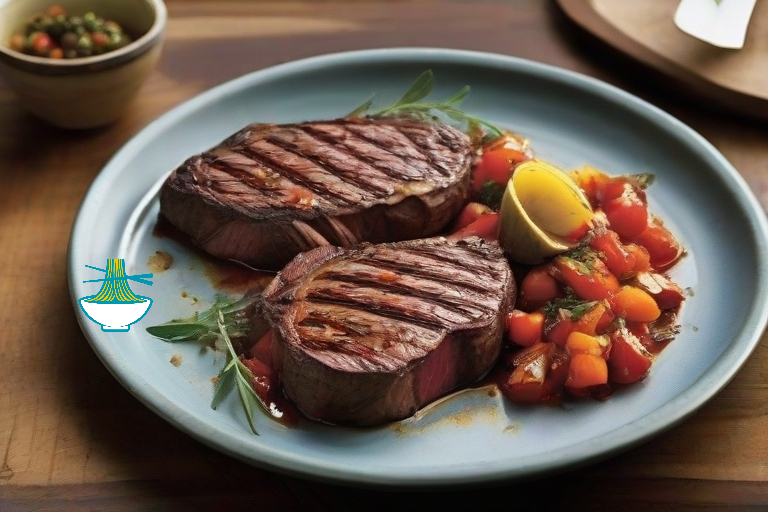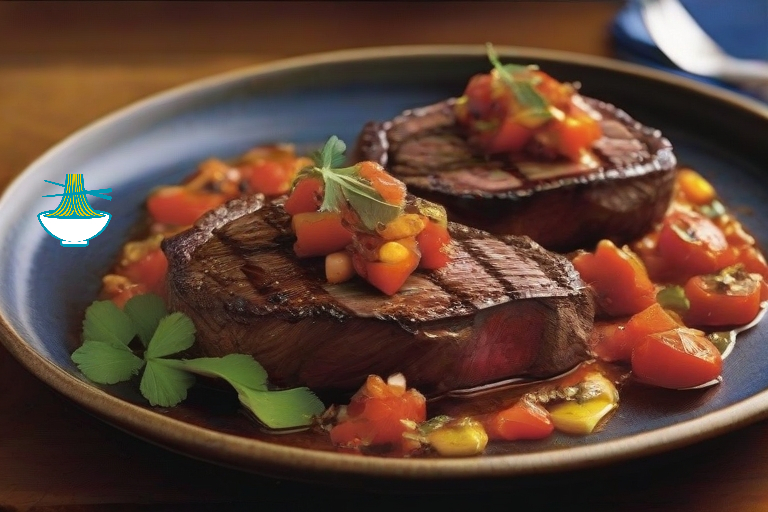Nestled within the heart of Australia’s vast landscapes, the kangaroo symbolizes the continent's unique wildlife and cultural identity. Grilled kangaroo steaks, paired with the rich flavors of bush tomato relish, offer a lean, protein-rich meal packed with essential nutrients like iron, zinc, and B vitamins. This dish is a powerhouse for muscle repair and energy production, boasting lower fat content compared to traditional red meats. However, moderation is key, as excessive consumption may lead to high cholesterol risks. Beyond its culinary appeal, the kangaroo's ecological role in maintaining Outback ecosystems highlights its integral connection to Australia's biodiversity and unique cuisine.
Ingredients:
- 4 kangaroo steaks (about 6-8 ounces each)
- 2 tablespoons olive oil
- 2 cloves garlic, minced
- 1 teaspoon dried thyme
- 1 teaspoon ground cumin
- Salt and black pepper, to taste
For Bush Tomato Relish:
- 1 cup bush tomatoes (dried or rehydrated), chopped
- 1 red onion, finely diced
- 2 tablespoons apple cider vinegar
- 2 tablespoons brown sugar
- 1 teaspoon ground coriander
- 1 teaspoon ground cinnamon
- Salt and pepper, to taste
Instructions:
Prepare the Kangaroo Steaks:
- In a small bowl, mix the olive oil, minced garlic, dried thyme, ground cumin, salt, and black pepper to create a marinade.
- Place the kangaroo steaks in a shallow dish and coat them with the marinade. Allow them to marinate for at least 30 minutes, or refrigerate for a few hours for a deeper flavor.
Make the Bush Tomato Relish:
- In a saucepan over medium heat, combine the bush tomatoes, red onion, apple cider vinegar, brown sugar, ground coriander, and ground cinnamon.
- Cook the mixture, stirring frequently, until the onions are soft and the tomatoes have broken down to form a relish-like consistency.
- Season the relish with salt and pepper to taste. Remove from heat and let it cool.
Grill the Kangaroo Steaks:
- Preheat the grill to medium-high heat.
- Remove the marinated kangaroo steaks from the refrigerator and let them come to room temperature.
- Grill the steaks for about 3-4 minutes per side for medium-rare, or adjust the cooking time based on your preference. Kangaroo meat is lean, so be cautious not to overcook to keep it tender.
Serve:
- Plate the grilled kangaroo steaks and generously spoon the bush tomato relish over the top.
- Garnish with fresh herbs, if desired, and serve with your favorite side dishes like roasted vegetables, sweet potato wedges, or a crisp green salad.
Enjoy this uniquely Australian dish, showcasing the rich flavors of kangaroo meat complemented by the exotic twist of bush tomato relish.
Serving Options:
- Pair with quinoa, mashed sweet potatoes, or a zesty cucumber salad for variety.
Frequently Asked Questions
Why is kangaroo meat significant in Australian cuisine?
- Kangaroo meat reflects the rich heritage of Indigenous Australians and aligns with modern sustainability practices due to its minimal environmental footprint.
Is kangaroo meat available outside Australia?
- Yes, it is exported to many countries, though availability may vary depending on local regulations and demand.
What can I use as a substitute for kangaroo meat?
- Venison or lean beef can be good alternatives due to their similar texture and flavor profile.
Can this dish be made vegetarian?
- Yes, you can use plant-based meat alternatives or portobello mushrooms to mimic the texture and create a vegetarian version.
How can I cook kangaroo meat without a grill?
- Pan-searing in a hot skillet or baking in a preheated oven are great alternatives.
What is the taste of kangaroo meat?
- Kangaroo meat has a robust, slightly gamey flavor with a tender texture when cooked properly.
Is kangaroo meat healthier than other meats?
- Kangaroo meat is leaner and lower in fat compared to beef or lamb, making it a healthier option for those seeking high protein and low cholesterol.
Are there health risks associated with eating kangaroo meat?
- Consuming kangaroo meat in moderation is safe, but improper cooking or overconsumption could increase the risk of foodborne illnesses or high cholesterol.
Is eating kangaroo meat ethical and environmentally friendly?
- Eating kangaroo meat can be considered ethical and sustainable when sourced from regulated and humane practices, as it helps control overpopulation and reduces ecological strain.
How should I store kangaroo meat before cooking?
- Keep it refrigerated for up to two days or freeze for longer storage.
Can I use other meats in this recipe?
- Yes, venison, lean beef, or even chicken breast can be used as substitutes.

Nutritional Values
Nutritional values can vary based on specific brands and exact measurements, but here are approximate values for the listed ingredients per serving:
Grilled Kangaroo Steaks (per 6-ounce steak):
- Calories: 150-200 kcal
- Protein: 28-32g
- Fat: 2-10g (varies based on cooking method and fat content of the meat)
- Carbohydrates: 0g
- Fiber: 0g
benefits:
- Kangaroo Meat: Lean source of protein, rich in iron and zinc.
Olive Oil (per tablespoon):
- Calories: 120
- Fat: 14g
- Carbohydrates: 0g
- Protein: 0g
benefits:
- Olive Oil: Healthy monounsaturated fats, contains antioxidants, may contribute to heart health.
Garlic (per clove):
- Calories: 4
- Carbohydrates: 1g
- Protein: 0g
- Fat: 0g
benefits:
- Garlic: Anti-inflammatory, antioxidant properties, may boost the immune system.
Dried Thyme (per teaspoon):
- Calories: 3
- Carbohydrates: 1g
- Protein: 0g
- Fat: 0g
benefits:
- Thyme: Contains vitamins and minerals, including vitamin C and iron; may have antibacterial properties.
Ground Cumin (per teaspoon):
- Calories: 8
- Carbohydrates: 1g
- Protein: 0g
- Fat: 0g
benefits:
- Cumin: Source of antioxidants, may aid digestion, potential anti-inflammatory effects.
Bush Tomatoes (1 cup, dried or rehydrated):
- Calories: 60-80 kcal (varies based on preparation)
- Protein: 2-3g
- Fat: 0-1g
- Carbohydrates: 15-20g
- Fiber: 5-7g
benefits:
- Bush Tomatoes: High in antioxidants, vitamins, and fiber; may have anti-inflammatory properties.
Red Onion (per medium-sized onion):
- Calories: 45
- Protein: 1g
- Fat: 0g
- Carbohydrates: 11g
- Fiber: 2g
benefits:
- Red Onion: Rich in antioxidants, contains quercetin which may have anti-inflammatory effects.
Apple Cider Vinegar (per tablespoon):
- Calories: 3
- Carbohydrates: 1g
- Fat: 0g
- Protein: 0g
benefits:
- Apple Cider Vinegar: May aid digestion, potential blood sugar control, contains acetic acid with antimicrobial properties.
Brown Sugar (per tablespoon):
- Calories: 52
- Carbohydrates: 14g
- Fat: 0g
- Protein: 0g
benefits:
- Brown Sugar: Adds sweetness; in moderation, it provides energy.
Ground Coriander (per teaspoon):
- Calories: 5
- Carbohydrates: 1g
- Protein: 0g
- Fat: 0g
benefits:
- Coriander: Contains antioxidants, may have anti-inflammatory properties.
Ground Cinnamon (per teaspoon):
- Calories: 6
- Carbohydrates: 2g
- Protein: 0g
- Fat: 0g
benefits:
- Cinnamon: May have anti-inflammatory and antioxidant properties, potential blood sugar regulation.
Keep in mind that these values are approximate and can vary based on specific products and preparation methods. Adjustments may be needed based on the actual ingredients used and serving sizes.


Comments